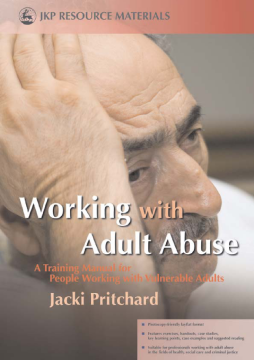
Additional Information
Book Details
Abstract
The manual is written in an accessible format with ample exercises and handouts, all designed for easy photocopying. Its great advantage is the material's transferability across all disciplines making it applicable to all professionals working with vulnerable adults. Each chapter offers an introductory discussion of a particular topic or question, such as how to identify different types of adult abuse and how to discuss and respond to a disclosure, highlighting the difficulties that may be associated with such a sensitive discussion. Her Classification of what constitutes different types of abuse in relation to differing ages, genders, ethnicities and cultures is sophisticated yet accessible, offering depth while avoiding stereotyping.
In my view, this is an ideal resource for training of support workers, nurses, social workers, care managers, training officers, police officers and students of these subjects. If such training can be interagency and interprofessional, then this is likely to provide even greater benefits.
- The Author, Journal compilation
`…comprehensively engages with all aspects of adult protection work, from suspecting or making an allegation that abuse is happening, through to the investigation and case conference stages. It achieves comprehensiveness by including consideration of risk assessment, but manages to do this by providing materials for both basic awareness training through to more advanced and in-depth training. The resource covers specific sections of society, such as older people, younger people, black and minority ethnic people, and specialised chapters including additional training materials and case studies. The material achieves clarity in the theoretical framework and helps the participant to work through what the theory means for practice. Exercises, handouts, key learning points, case examples and suggested reading are all part of this approach.'
- Leveson Centre Newsletter
Working with Adult Abuse is a comprehensive training resource, which can be used by anyone who works with vulnerable adults across the sectors (statutory, voluntary and independent). It can be used by people who have a responsibility for training within any organisation, but also by any individual worker or student.
The resource covers all aspects of adult protection work, from suspecting or making an allegation that abuse is happening in the community or in a communal setting through to the investigation and case conference stages, including consideration of risk assessment and the development of protection plans. In doing so, it provides materials for basic awareness training courses through to more advanced and in-depth training.
Practical advice is presented within the historical context of adult abuse guidance and policy development. This is complemented by specialised chapters on the abuse of specific sections of society, such as older people, younger adults and black and minority ethnic people, which provide additional training materials and case studies. Each chapter offers an introductory discussion of a particular topic or question, such as exactly what constitutes adult abuse, how to respond to a disclosure of abuse, when to report abuse and to whom. Exercises, handouts, key learning points, case examples and suggested reading are also included. The resource, which is presented in a large A4 format, includes a wealth of photocopiable materials.
This is an ideal resource for the training of social workers, care managers and workers, training officers, police officers, students of social work and those undergoing NVQ or post-qualification training.. It will also be helpful to unqualified staff such as home carers, residential staff and support workers.
This book will be useful for a range of professionals (especially trainee doctors, nurses and social workers in the wards of Departments of Geriatric Medicine), care-managers and police officers. Clearly, the eventual beneficiary will be the vulnerable adults... It is crucial then that all Accident and Emergency Departments, Departments of Medicine for the Elderly, libraries, nursing and care homes, as well as other relevant organisations, have a copy. This will enable the involved professionals to equip themselves well in advance in dealing with suspected sufferers of abuse.
Age and Ageing
The materials provided in this easy-to-photocopy book allows trainers, whether in a health care context or education to deliver comprehensive, effective and sensitive training in this difficult area.
Signpost
Pritchard, a registered social worker and a social work trainer and consultant in the UK, offers a comprehensive training manual for social workers, health care staff, probation and prison staff, hospice workers, and others who work with adults who are vulnerable to abuse. The manual covers understanding, recognizing, and investigating adult abuse, developing protections plans, and the importance of documentation. Three final chapters present cases on issues related to the abuse of older people, the abuse of younger adults, and the abuse of black and minority ethnic people.
BookNews.com
Jacki Pritchard is a qualified social worker with the General Social Care Council with extensive experience as a practitioner and manager in both fieldwork and hospital settings. She is currently working as an independent trainer, consultant and researcher focusing on abuse, risk and violence, and is series editor of the Good Practice in Health, Social Care and Criminal Justice series and the Violence and Abuse series, both published by Jessica Kingsley Publishers.
A useful resource for training staff.
The Journal of Adult protection
Table of Contents
| Section Title | Page | Action | Price |
|---|---|---|---|
| Prelims (Acknowledgements, Contents, Foreword by Bob Linney) | |||
| 1. Visual aids for development; How to use this book; Different types of visual aids; | |||
| 2. Pre-testing; Basic drawing skills; Guidelines for making visual aids | |||
| 3. Development Drawings |
